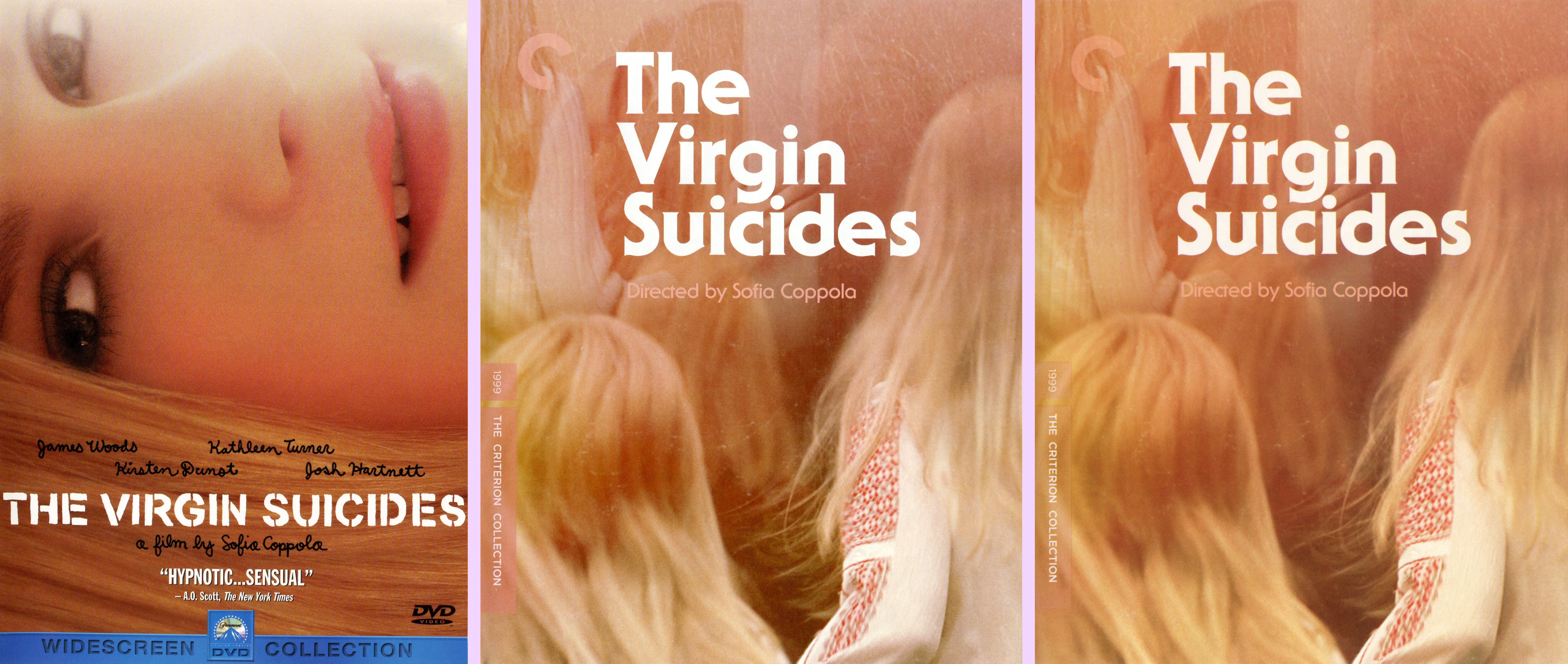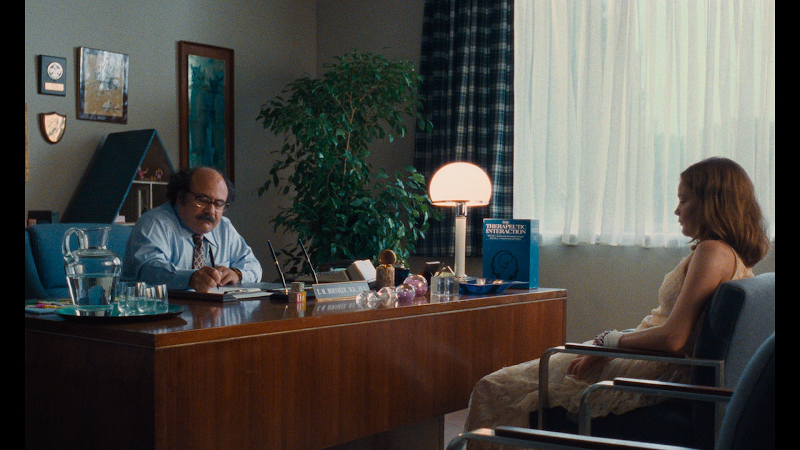Update 7/22/18 - 7/8/22: Four years later and we're into true 4k. Criterion has just reissued their release as a 2-disc 4k Ultra HD/ BD combo-pack.
Suicides is Coppola's first feature, based on the novel by Jeffrey Eugenides. She may've found her audience more with her second film, Lost In Translation, but between the two, this is the one I find myself going back to. They share that same charming recreation of a moment in time that Coppola brings to all of her work, but maybe it's just the heft of the overt melodrama adding some lasting weight to this one. It's the relatable tale of an implausible scenario, where a group of neighborhood boys try to penetrate the romanticized veil of five beautiful sisters who all took their own lives in a small 70s suburb. The kids are all perfect, from the known (Kirsten Dunst) to the unknown, and the rest of the cast is full of heavy hitters like Kathleen Turner, James Woods and Scott Glenn.
Paramount first put The Virgin Suicides out on DVD back in 2000. It was a pretty decent, anamorphic widescreen edition, and so that had been my sole copy of this film all the way up until 2018. But then Criterion gave it a pretty sweet 4k restoration from the original 35mm negatives, and with all new extras to boot, including Coppola's first short film, Lick the Star. Still, that was just a 1080p blu-ray release, so now that Criterion has entered the 4k market, it only made sense that they'd reissue this as a UHD. It's now a 2-disc set, with just the film on the new UHD, and the BD is exactly the same as the 2018 one, in every way.
 |
| 1) 2000 US Paramount DVD; 2) 2018 US Criterion BD; 3) 2022 Criterion BD; 4) 2022 Criterion UHD. |
Apart from that, the new 4k restoration is heaps clearer. Maybe you don't see it so much embedded in the post, but click through to compare them full size, and you'll really see the difference, even on the 1080p blus. Grain is very present and natural, and the distinction is pretty strong despite the fact that the compression's actually pretty decent for such an old DVD. And the colors? Well, it's hard to miss the heavy green shift in that first set of shots, but as you can see, that's not consistent throughout the film. Or, at least, not to the same degree. Just look at the second set of comparison shots with Danny Devito and a stronger bluer hue. It doesn't scream "lime-flavored" like the other comparisons, above and below, but you can still see the additional yellowish green there, too, if you focus. And if you were expecting the new UHD to come in and push the pendulum back in the other direction, no, they've stuck to their guns.
 |
| 1) 2000 US Paramount DVD; 2) 2018 US Criterion BD; 3) 2022 Criterion BD; 4) 2022 Criterion UHD. |
And whatever your thoughts on the color timing, you can't argue with the increased resolution of the 4k. We've definitely gained ground in 2022. Look how much smoother and unpixelated all that text is, and for the first time, I can read "VOLUME I" and "VOLUME II" on Devito's book cover. Grain is more natural, too. Whether you have a display big enough to appreciate it may be another matter. But at least, with our close-up comparisons, you don't have to take it on faith that the picture quality on your latest upgrade is superior.
Audio-wise, all four discs give us the single English 5.1 mix, though it's bumped up to DTS-HD for the blus and UHD. The DVD also had a French dub, and they all provide optional English subtitles.
In terms of special features, Paramount's DVD was already fairly decent. Not exactly a packed special edition, but it included a really good, 23-minute behind the scenes doc that gave some really good, and sometimes funny, insights into the filming. And they had a few other minor bibs and bobs, like the music video for the Air song that Coppola also directed, a stills gallery, insert and trailer. Criterion kept all of that, so thankfully there's no need to hang onto your eighteen year-old DVDs any longer - yay!
And in 2018, they also created some great new stuff. Primarily, they've put together an excellent new, 26 minute documentary with Coppola, Dunst, Hartnett and cinematographer Ed Lachman. And possibly even more excitingly, there's an on-camera interview with the novel's author, Eugenides. Then there's an interview with Tavi Gevinson, who runs a fashion website or something that was influenced by this movie? I wasn't entirely clear on that, but she did have some good insights into the movie, effectively acting as a critic's take. There's an attractive, fold-out/ leaflet style insert with an essay by novelist Megan Abbott, a second trailer and of course, there's Lick the Star.
It's a black and white, only fourteen minute short; but it's actually quite good and contains a lot of what makes Coppola's features so compelling. This isn't like Todd Haynes' Suicide, where it might be interesting for devotees to get a peak at his origins, but that's it. This is a surprisingly dark film about the cut throat social hierarchy of high school that I watch and enjoy for its own artistic merits, not just because it's some minor film history artifact. In fact, it's not even the first time I've owned it on disc. I suppose this is a bit of a deep cut, but it was originally included as "This Month's Short Film" on the 2003 Film Movement DVD of Hop.
 |
| 2003 US Film Movement DVD. |
As you can see, it's slightly window-boxed in the overscan area, leaving it with about a 1.83:1 aspect ratio. It's got removable English subtitles and interlacing problems. The only extras are the trailer, a booklet with brief notes about the film, and of course Lick the Star.
 |
| 2003 US Film Movement DVD top; 2018 US Criterion blu bottom. |
I haven't bothered with screenshots for Lick the Star in 2022, because the BD is the exact same disc, and the short isn't included on the UHD. So nothing's changed there.
So, the 2018 blu was a little controversial for its role the on-going Criterion green debate. And the 2022 release has done nothing to settle or further it, except to show that Criterion was willing to double down on their timing... So there's still a little question mark there; but at worst, we're talking about a minor possible flaw on an otherwise terrific, top-notch release. High quality scan, especially now that it's in full 3840p, with terrific new extras and even a restoration of Lick the Star. It's a must for Coppola fans no matter how you look at it.




























why can't they just scan the film and not change anything?
ReplyDelete